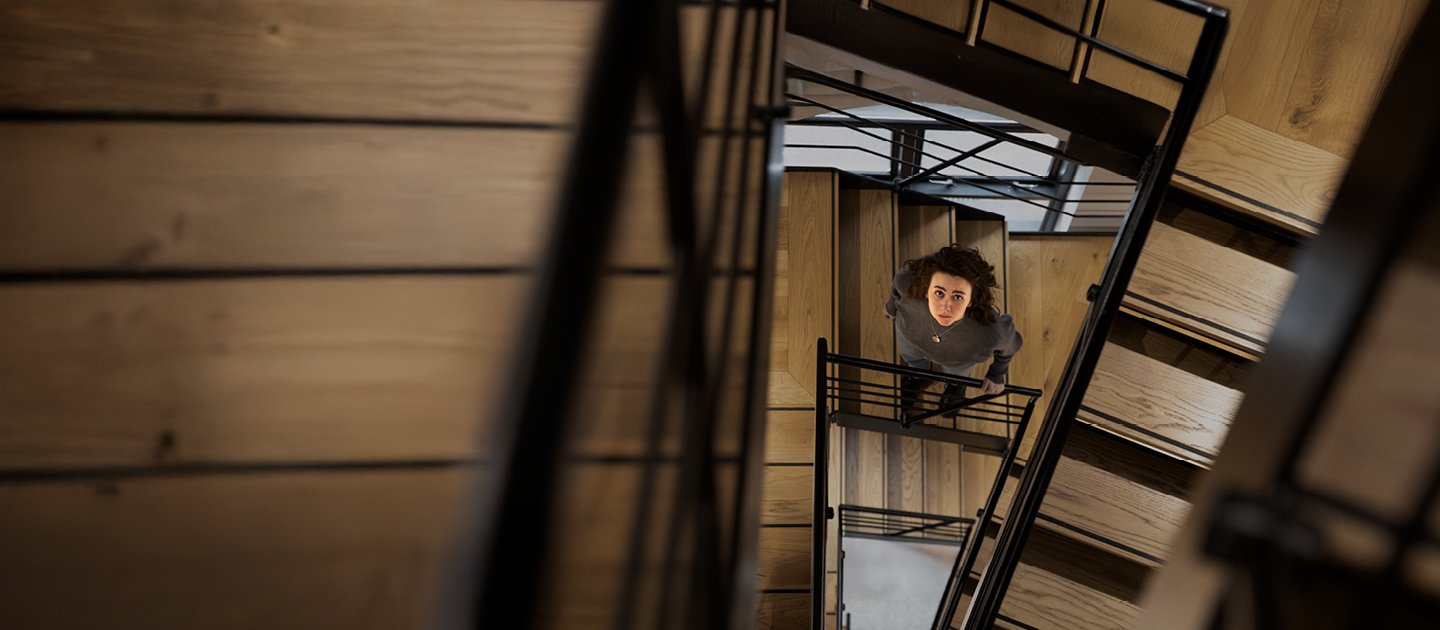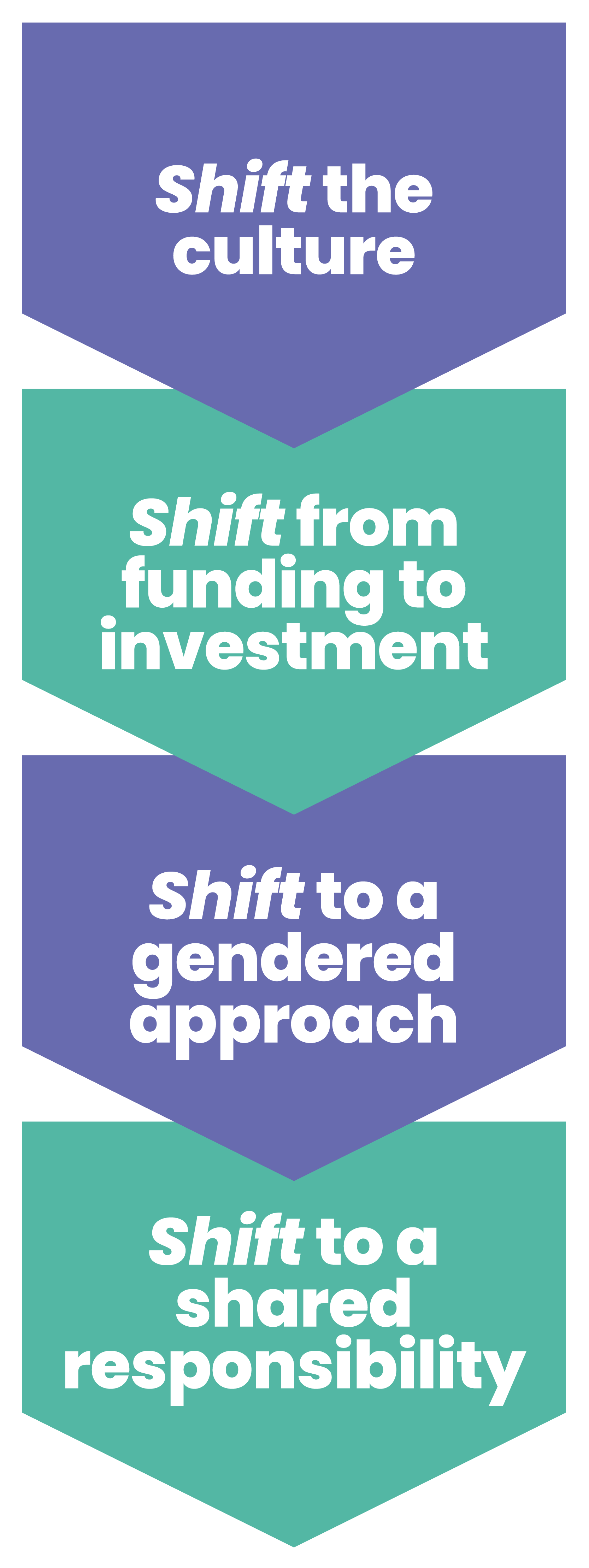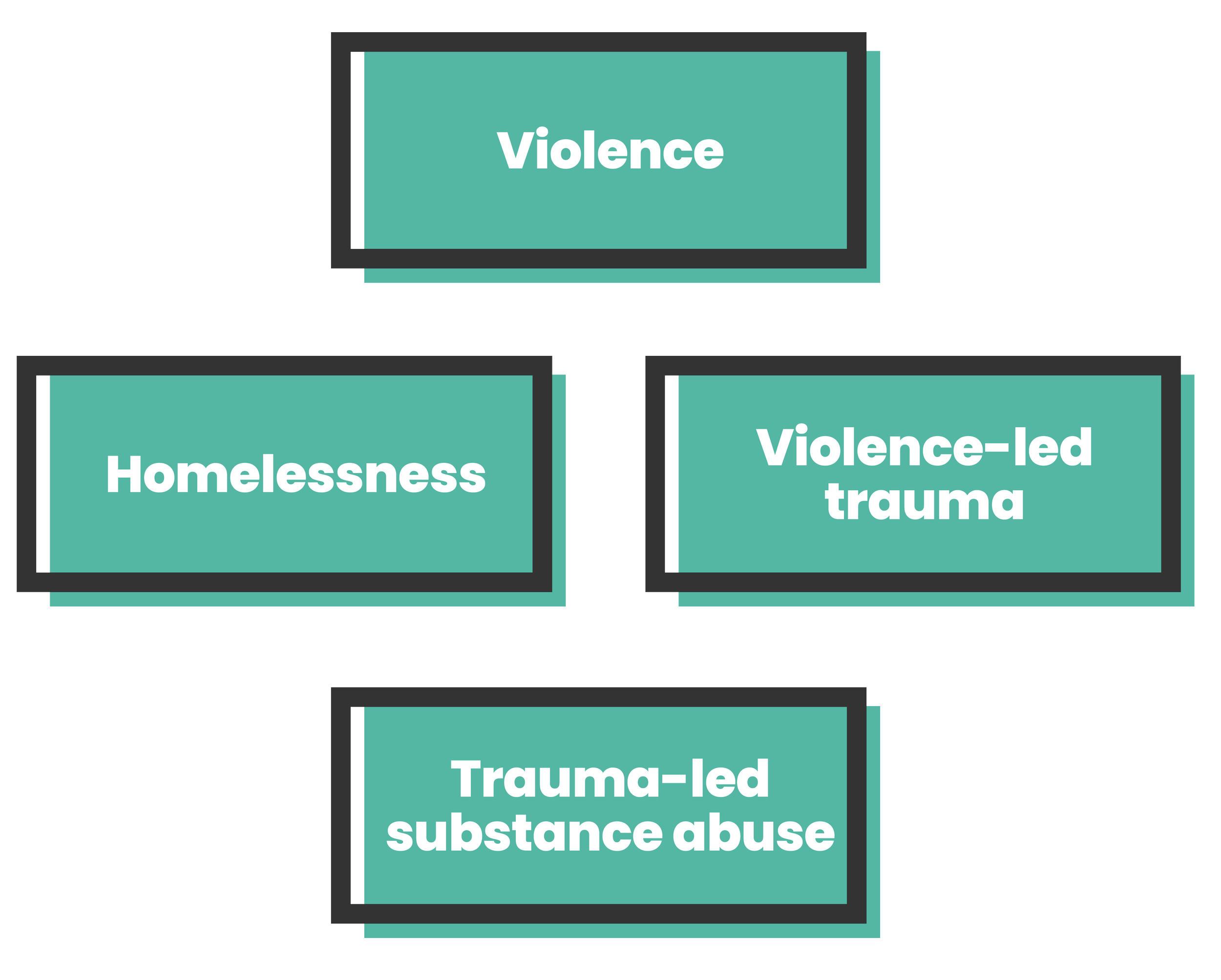
Shift the shame
Violence against women
causes
homelessness
Home is still the most dangerous place for women*
Today in Northern Ireland, when a woman is facing violence in her home, her steps to safety are not secure. Our culture, our authorities, all encourage her to leave home in search of safety, increasing her risk of becoming homeless and pushing her into an exhausting, compounding cycle of humiliating choices that deepen trauma and cause even more harm. Stay alive, or lose your home? This is not a choice.
*2023 UN Women Report
Violence against women and girls
causes homelessness. Fact.
Violence has a profound and lasting impact on women and the children who live with it. Research at international, UK and NI specific levels, show that women who have experienced violence are much more likely to face homelessness.
If we Shift the Shame from the woman who needs help to the abuser. If we share the responsibility to create #stepstosafety for women facing this impossible choice. If we stop stigmatising women with trauma led addictions. If we spare our children the distress that builds from growing up around violence… we will save lives and create a society we can all be proud of.

“Northern Ireland is currently failing women
at the moment when they most need help.”
Dr Lynne McMordie, Heriot-Watt University
The Steps to Safety:
Protecting the next generation
-
In NI we used to say things like, "you've made your bed, now lie in it", or "say nothing" or even "that's none of my business". Violence thrives on silence and ignorance. That's why we want everyone in NI to learn and have the words to talk about different forms of violence.
We want people to stop saying, "Why doesn't she just leave?", when leaving her home often leads to a multitude of harms. We want to shift the shame women feel for their natural responses to trauma, eg not recognising or accepting the situation, or turning to substances or alcohol to cope. We want to normalise stepping in to help, giving family, friends and professionals the language to stop saying nothing and "say something".ACTIONS:
- 1 Prioritise prevention through education by spreading the word about the tools currently under development by the EVAWG Directorate like the All Equal, All Safe toolkit, the Power to Change campaign board game and Women’s Aid Helping Hands educational programme.
- 2 Enable effective responses by making trauma informed training mandatory for all medical professionals, legal professionals, police and housing officers.
- 3 Empower women to stay in their own home by strengthening protection orders and their enforcement.
- 4 Stop the stigmatisation of women who use substances to cope with trauma by recognising that substances are a coping mechanism and not a choice.
-
If we shift our mindset from funding to investment, we can expect a return. The ambitions we had after the Good Friday Agreement included creating a world-leading mental health system, a must-have for any post-conflict society. The reality has fallen short. Our mental health services and addiction/trauma recovery and rehabilitation services are inadequate, lagging behind other parts of the UK and Ireland. The misogyny that comes with paramilitarism remains unchanged and largely unchallenged. We don't have enough social and affordable houses or safe temporary accommodation for women facing violence. Peace came to NI decades ago, but our society is still not safe for women and girls and won't be until we properly invest in the protection and wellbeing of women facing violence.
ACTIONS:
- 1 Lobby government for investment in social housing and strengthen the role of social housing providers in enabling women who have experienced violence to retain their tenancies.
- 2 Encourage The Executive Office to strengthen and expand their duty to prevent homelessness and encourage the Housing Executive to prioritise homelessness prevention for women facing violence and to expand the Sanctuary Scheme that enables more women to remain in their houses.
- 3 Lobby government for urgent investment in our mental health and addiction services, including services for women who use substances to manage the trauma of violence, all proven to reduce violence against women.
- 4 Back access to safe, self-contained temporary accommodation for women who choose to leave their own homes and call for an immediate end to the use of shared options like B&Bs, shelters and mixed-gender hostels.
-
Statistics prove that the vast majority of domestic violence happens by men towards women. Women who face violence are much more likely to face homelessness. Research shows that Non-Molestation and Occupation orders are inaccessible for many women and when obtained, do not work to enable women to remain in their own homes.
Women with children are particularly vulnerable with shared parental access often used as an excuse to continue post separation abuse. Some women with children are forced to leave their children behind, causing further inherited trauma. This is a gendered issue that needs a gendered response with both short and long term actions. Along with more long term social housing, we need more short term, small-scale emergency accommodation that is safe and appropriate for women and their children.
This combined approach will stop millions of pounds being wasted on sometimes unsafe, even violent emergency accommodation like B&Bs, hotels and hostels.ACTIONS:
- 1 Create specific action plans for all women facing violence including women living rurally, women with No Recourse to Public Funds, the LGBTQ+ community, women living with disabilities and other minority communities who can face significant barriers to seeking help.
- 2 The Department of Justice must act urgently so that women facing violence can access protection orders and ensure that where granted, they are effectively enforced with the specific aim of preventing homelessness for female victims.
- 3 Ensure access to appropriate housing options for women with complex needs, including those who use substances, by expanding the Housing First model to provide stable housing as a foundation for addressing other needs.
-
Proactive prevention is always smarter than waiting for the worst to happen. Usually, a broad range of public services, like housing, police, health, and education, interact with women facing violence prior to homelessness. We would like to create a shared public duty in preventing homelessness. Following the example being set by the Scottish government, we would like Northern Ireland to explore 'Ask & Act', a requirement for all public bodies to work within their existing remits to share the responsibility for recognising and preventing homelessness among women and children at an earlier stage.
ACTIONS:
- 1 Inform everyone in society about the strong connection between violence against women and homelessness.
- 2 Inform everyone in society about the terrifying reality of finding yourself homeless and the long term damage it can do to your health, your family’s health and society as a whole.
- 3 Establish a cross-body committee to explore how NI public bodies can Ask & Act within their current remit with the help of statutory powers needed to ensure effective prevention.
- 4 Set up common systems of reporting data among public bodies, ensuring that all bodies are working together to prevent homelessness among women facing violence.
Shift the culture
Shift from funding to investment
Shift to a shared responsibility
Shift to a gendered approach
Campaign integrity
The Shift the Shame campaign movie was created with the help of 31 women with lived experience of violence and homelessness in Northern Ireland. Playwright Louise Mathews then proudly translated their words into the following piece.
Women who experience violence are
significantly more likely to face homelessness.
Violence against women doesn’t discriminate and it can be physical, financial, emotional and sexual. Any woman, from any background, can have her life derailed or destroyed by violence from intimate partners or family members. In 60-80% of households where violence is present, children are also present. The NI Executive needs to place a stronger emphasis on the link between violence and homelessness, embedding housing security for women as a key preventative measure.
30
30 women and girls were
killed by men in NI between 2019-2024*
4000
4000 sexual offences
were recorded in NI in 2023/2024*
16 mins
Every 16 mins police in NI responded to a domestic abuse incident in 2023/2024*
69%
Most victims of domestic abuse crimes in NI in 2023/24 were women.*
Source: PSNI (2024) Tackling violence against women and girls: Action plan years 3-7
Violence & Homelessness:
The Compounding Cycle
Violence compels women to leave their homes in search of safety. Trauma from violence makes it harder for women to find and keep stable housing. Women living in mixed-gender emergency accommodation face increased risk of violence. Homelessness exacerbates trauma and for a small group of women, can trigger increased substance abuse, which then makes it harder to secure safe accommodation.
Every stage of this cycle is devastating and
nearly impossible to break from. We must change the system and shift the shame.
In a way, violence would be easier to understand and deal with if every act of aggression left a visible mark. Unfortunately, research shows that violence against women and girls takes many forms, some obvious, some insidious, all leaving a legacy of destruction that can live on for generations. The referenced study shows that most perpetrators are intimate partners, but can often be parents or family members.
These insights have been informed by “Violence Against Women and Homelessness” report by Lynne McMordie, Suzanne Fitzpatrick and Sarah Johnsen, March 2025, Heriot-Watt University, I-SPHERE, The Community Foundation NI and The University of Edinburgh.
Violence at home defined
Psychological Abuse
Persistent, derogatory remarks about a woman’s worth, intelligence and appearance, belittling and controlling behaviours, backed by threats and intimidation.
Result - Women feel deep and enduring feelings of shame,
insecurity and displacement.
Coercive Control
Imposing strict regulations on women and girls regarding who they talk to, what they wear and how they behave. Initially this may be framed as protection or kindness, but the control escalates over time. When a woman leaves a partner, he will often use stalking and surveillance to increase her fear and maintain control.
Result - Women feel isolated, trapped and desperate.
Financial Abuse
Denying women access to their own income, coercing women to leave employment or work excessively without access to earnings. Incurring debts in women’s names, misusing joint accounts or stealing money from them. Limiting their liberty and choices. Dismissing her input and making her feel incompetent. Withholding access to money when
a woman tries to leave.
Result - Women feel trapped and forced to depend on an abuser.
Physical Abuse
Sustained and escalating assaults sometimes framed as ‘for your own good’ and violence often accompanied by extreme physical control. When partners are linked to paramilitary organisations, women often feel entirely unprotected.
Result - Women feel near constant fear, profound negative impact on physical and mental health.
Sexual Abuse
Childhood and adult sexual abuse. Being raped, sexually assaulted, degraded and humiliated. Being coerced into sex sometimes in return for contact with children.
Result - Women suffer severe harm caused by physical and emotional suffering.
Post Separation Abuse
When a woman leaves the home, the abuser continues to surveil, monitor, threaten or harass her, leading to housing instability and homelessness. Sometimes women return to their abuser to avoid the insecurity of not knowing where or when he will turn up. Post separation abuse can last for years, harming women’s mental and physical health,
Result - Women suffer a loss of
control and hope, fear, insecurity and homelessness, unable to move on with life.
What can we do?
Campaign to Shift the Shame
Ask us for posters and social posts for your organisation to share.
Read the report commissioned by Community Foundation Northern Ireland - written by Lynne McMordie Suzanne Fitzpatrick and Sarah Johnsen.
Change attitudes around recognising violence of all forms from a young age. Encourage your local youth club or post primary school to play the Power to Change board game or the All Equal All Safe Toolkit developed by the Education Authority and the End Violence Against Women and Girls strategic framework.
Educate those around you about recognising different kinds of violence. Encourage your workplace to do Raise Your Voice training on EVAWG.
Write a letter to your local MP asking for a shared public duty to prevent homelessness and for NI to recognise the integral role violence has to play in homelessness among women and children.
Spread the word about Clare’s Law (the Domestic Violence and Abuse Disclosure Scheme)
Request a background check on any potential intimate partners to see if they have a record of committing violence against women or girls.
If you think someone you know is in danger at home, let them know your concerns. It is your business. Staying silent is not the answer.
Write a letter to your local MP asking them to include women who uses substances in access to services and end the No Recourse to Public Funds policy which makes refugee women more vulnerable.
Donate to some of our local organisations who are making a difference and working hard to change the culture of Northern Ireland to keep women and girls safe: Women’s Aid, People’s Kitchen,
Rape Crisis Service, Raise Your Voice,
Here NI.
Created by WRDA and funded by the Community Foundation NI with the help of the steering committee:




















